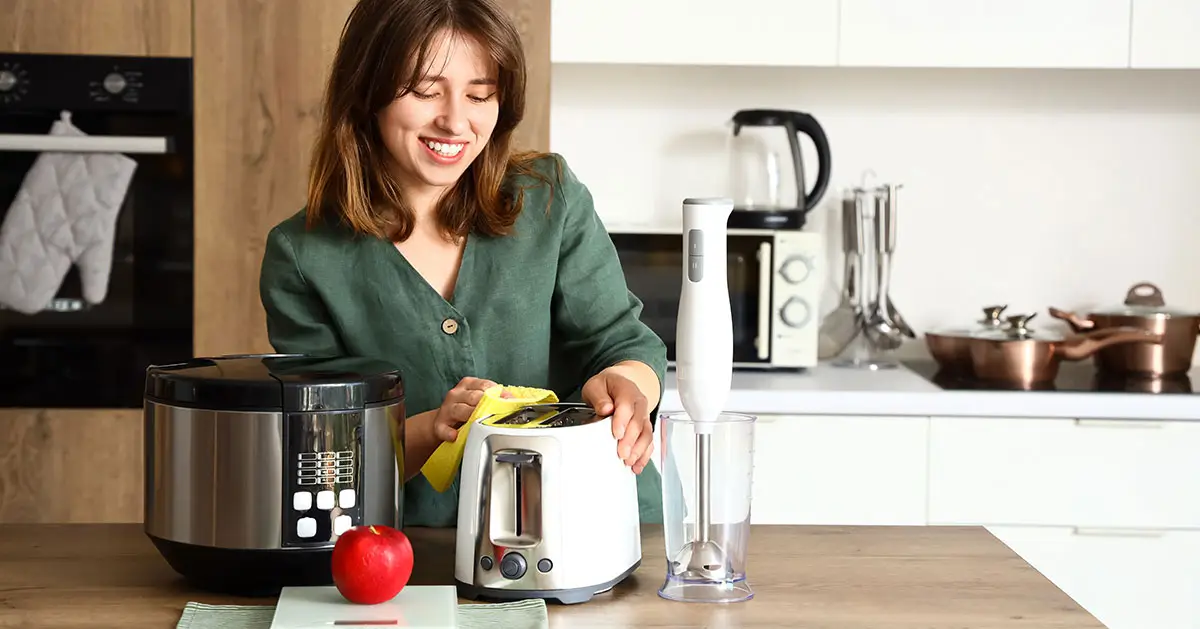Appliances aren’t cheap: Here’s how to make them last
Let’s be real. A top-of-the-range fridge in South Africa can cost R1 million (yes, you read that right). Even if your budget isn’t fit for a king, your household appliances are still a major investment. So, how do you make sure your trusty washing machine doesn’t conk out just when you need it most?
Why appliance longevity matters
Your appliances are part of your daily life, helping you store food, clean clothes, and keep your home comfortable. Replacing them frequently isn’t only expensive but also inconvenient. Taking steps to extend their lifespan can save you money and help you get the most value from your investment. Plus, making appliances last longer means less waste going to landfills, which is a win for your pocket *and* the planet.
Tips to keep your appliances in tip-top shape
1. Keep them clean
Fridges, washing machines, and dishwashers all perform better when they’re clean. Dust, lint, and dirt can clog vents and filters, making them work harder (and use more electricity!).
- Fridges: Dust behind them regularly, defrost when necessary, and top up the gas when needed.
- Washing machines & dishwashers: Clean filters and water connections often to prevent blockages.
- Microwaves and ovens: Wipe spills immediately to prevent grease build-up, which can cause damage and unpleasant odours.
2. Don’t overload your appliances
Stuffing your washing machine or fridge beyond capacity may seem efficient, but it actually causes strain on the motor and reduces its lifespan. The same goes for dishwashers and ovens. Overloading means uneven performance and increases wear and tear.
3. Service regularly
Just like cars, appliances need regular servicing. Have your washing machine checked annually, and keep an eye on any strange noises or leaks. Get your fridge’s gas checked and recharged when needed, and ensure your air conditioning unit is serviced before summer kicks in.
4. Invest in quality over price
Cheaper appliances often come with shorter warranties and limited support. Sometimes, spending a bit more upfront can save you loads in repair costs later. Look for brands with strong warranties and good after-sales service.
5. Use appliances as intended
Read the manufacturer’s guidelines on proper usage to avoid unintentional damage. Using appliances incorrectly can void warranties and lead to costly repairs. For example, running a washing machine on a high spin with delicate fabrics or placing non-microwave-safe dishes in the microwave can cause avoidable damage.
6. Protect against power surges
Power surges, whether from lightning or loadshedding, can cause major damage to appliances. Invest in surge protectors or uninterrupted power supply (UPS) devices to protect your gadgets from electrical damage. This is especially important in South Africa, where unpredictable power cuts are a reality.
7. Check and replace seals
Worn-out door seals on fridges and ovens allow heat or cold air to escape, forcing the appliance to work harder and increasing energy costs. Regularly inspect seals and replace them if they appear cracked or loose.
8. Use the right detergent and settings
Using too much detergent in washing machines and dishwashers can lead to residue build-up, damaging internal components over time. Similarly, using the wrong settings for different fabrics or dishware can cause unnecessary wear and tear.
9. Let your appliances rest
Your appliances work hard, so let them take a break! Continuous operation, like keeping a washing machine or dryer running back-to-back loads, can overheat the motor. The same applies to microwaves and air conditioners. Let them cool down between uses.
10. Store properly when not in use
If you have appliances that aren’t used daily, like deep freezers or dehumidifiers, store them properly. Ensure they’re in a dry, cool space to prevent rust and mildew. Keep cords neatly wrapped to avoid damage.
Does home contents insurance cover wear and tear
Nope! Insurers don’t cover gradual damage. That’s why regular maintenance is key. However, lightning damage and loadshedding related surges can be covered if you’ve added them to your policy.
The insurance safety net
The best way to protect your household investment? A comprehensive home contents policy. Home contents insurance covers your appliances against risks like theft, fire, and power surge damage (if added to your policy).
Not all home content policies are created equal, so make sure you know what’s covered and what’s not. With King Price, you get comprehensive home contents insurance that adjusts as your needs change. Plus, you’ll enjoy royal service and affordable premiums.
Chat to King Price to ensure you’ve got the cover that suits your castle. Get a quote now or call 0860 50 50 50.
FAQs
1. How often should I clean my fridge coils?
At least twice a year to prevent dust build-up that can make the motor work harder.
2. Can I insure my appliances separately?
Yes! Some insurers, like King Price, allow you to specify high-value items like fridges or TVs under home contents insurance.
3. What’s the best way to protect my appliances from load shedding?
Use surge protectors and invest in a UPS to keep essential appliances running safely during power cuts.
4. How can I tell if my appliance seals need replacing?
If your fridge or oven door doesn’t close tightly, or if you see cracks in the seal, it’s time for a replacement.
5. Will my home contents insurance cover an old appliance that suddenly stops working?
No, standard insurance won’t cover wear and tear. However, if the failure is due to an insured event, like a power surge, you may be covered.
